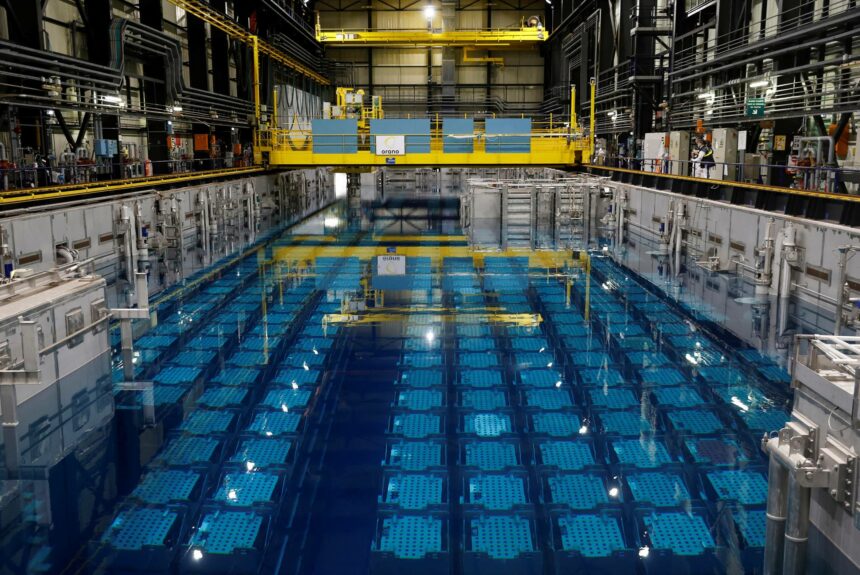Support for nuclear power has climbed in the past few years as concerns over climate change and grid reliability have mounted. While nuclear energy is clean, safe, and reliable, it has been held back in large part due to economics and a lack of a permanent storage repository for spent nuclear fuel. Broken policy is a big contributor to both, artificially inflating the cost of nuclear power and resulting in an inability to fully manage spent fuel. A recent House Energy and Commerce hearing examined the U.S. policy toward spent fuel management and ways to unleash its recycling and permanent storage.
>>>READ: U.S. Inability To Address Nuclear Waste Harms Environmental Progress
When the U.S. began its build-out of nuclear power plants in the ’60s, the industry planned to handle waste through spent fuel recycling. In 1963 Idaho National Laboratory (INL) began reprocessing spent fuel and in 1966 the Atomic Energy Commission (the Nuclear Regulatory Commission’s predecessor) licensed a fuel reprocessing facility near Buffalo, New York.
Proliferation concerns halted the U.S. build-out of fuel reprocessing in 1976. In 1982 Congress passed the Nuclear Waste Policy Act (NWPA) which directed the Department of Energy (DOE) to site and build a permanent repository for spent fuel. DOE ultimately picked Yucca Mountain in Nevada because of its unique geological structure—the site is in the middle of the desert, 1,000 feet below the ground and 1,000 feet above the water table.
Political boondoggling halted the project, leaving spent fuel at interim storage sites (which are often next to nuclear power plants) around the nation. Because DOE still has the obligation to handle this waste, utilities, which were paying into the Nuclear Waste Fund—an account that taxed nuclear power production to fund the construction of a permanent repository—successfully sued the federal government for failing to fulfill its duties under the NWPA. As a result, taxpayers have been forced to pay utilities nearly $9 billion since 1998 to house spent fuel.
Members agreed that the current situation is untenable. Rep. Jeff Duncan, the Chair of the Subcommittee, stated, “[S]pent nuclear fuel is stored safely on sites, but the federal government must fulfill its legal responsibility and reduce the cost burden to taxpayers and ratepayers.” Meanwhile, Dr. John Wagner, the director of INL and witness at the hearing said:
“Our nation has an obligation to address its nuclear-waste management responsibilities. We have the technical capacity and knowledge to manage spent nuclear fuel responsibly and safely – and are doing so today at the current and former nuclear power generation sites, but that is not a permanent solution. The present nuclear-waste stalemate inhibits the U.S. nuclear industry from fully meeting the challenges of today and tomorrow.”
Addressing these challenges will require legislative reforms and technological breakthroughs. In terms of policy, the expert witnesses encouraged the lawmakers to reform the NWPA with the 2012 Blue Ribbon Commission on America’s Nuclear Future recommendations in mind. These include forming a new federal organization with a singular mission to manage spent fuel, establishing a consent-based siting approach for future repositories (the only recommendation implemented to date), and creating a consolidated repository for nuclear fuel.
The witnesses also noted that while reprocessing is in the national interest—96% of the nation’s spent fuel could be reprocessed and fully meet our energy needs for the next 100 years—it is expensive. Dr. Wagner pointed out that France’s nuclear fuel recycling, considered the global gold standard, is done not because it is economical, but because it is a part of the nation’s federal policy. And while nuclear fuel recycling could address a large share of our spent fuel inventory, a permanent repository is still needed.
>>>READ: Securing America’s Nuclear Energy Fuel Supply Chain
While the policy in this space is lacking, private sector innovations are not. Curio, for instance, is working closely with Idaho National Lab (INL) to build a reprocessing facility harnessing its NuCycle technology. The company is planning to open a facility the size of an NFL stadium that will be able to reprocess 4,000 tons of waste annually. The U.S. currently has about 90,000 tons of spent nuclear fuel.
Oklo is creating a microreactor with a closed-loop fuel cycle that will recycle the waste its plants generate. The company is also working with INL to demonstrate its Aurora reactor at the lab’s facilities.
As Oklo and Curio demonstrate, the biggest hurdle to durable spent fuel management is the federal government’s control of the process. While the federal government should own the spent fuel long-term because it is in the interest of public safety and health, the private sector can more effectively manage and reprocess spent fuel than the government could and at a lower cost.
Additionally, several public-private initiatives could create durable reprocessing solutions. The DOE’s Advanced Reactor Demonstration Program is working with TerraPower to deploy the Natrium sodium-cooled fast reactor in Kemmerer, Wyoming. Like the fast reactors the U.S. developed in the 1960s, Natrium will be able to run on spent fuel.
The lack of a spent fuel repository should not discourage the U.S. from pursuing nuclear power. At the same time, the current status quo is not sustainable for taxpayers or the industry. The private sector is ready to address America’s spent fuel needs. Now it’s up to policymakers to implement laws to streamline innovation and provide a comprehensive strategy to address spent fuel.
The views and opinions expressed are those of the author’s and do not necessarily reflect the official policy or position of C3.
